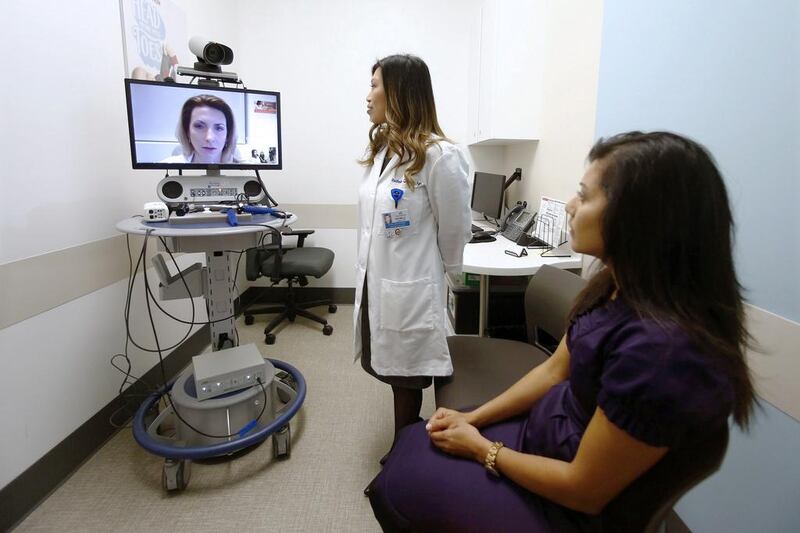Putting aside the cost of medications and more complex treatments, simply paying a visit to a physician can bring with it a hefty price tag. Figures from 2014 in the UAE, for example, put the average trip to the doctor’s office at US$78.50.
It is a considerable amount – largely absorbed by the employers – and those costly physician visits add up in the form of insurance premiums that are all but expected to rise with each annual policy renewal.
In an attempt to reverse rising healthcare costs we must consider alternatives to many aspects of our healthcare system. And one key area where we are seeing the potential for considerable change – change that is already resulting in very significant cost savings – is in alternatives to the face-to-face physician consultation model.
To this end, the “virtual doctor” is catching on in many countries as more patients access medical care and advice through their laptops and smartphones. Thanks to a range of online portals and apps – and companies built from the ground up that only provide virtual physician services – the virtual doctor is starting to go mainstream.
While a virtual consultation is clearly not always going to be a suitable replacement for a face-to-face meeting, for many health conditions and concerns it is, quite simply, just what the doctor ordered. And when there is a fit, it not only makes sense from a financial point of view for individuals and employers, but also from a convenience standpoint. After all, why leave my home or office when I can have a private consultation with a doctor at the click of a button and address the issue just as thoroughly as if I were in the physician’s office?
So how does it work? First off the “virtual doctors” in question are very much real – not bots or avatars or symptom checkers. These are actual physicians making professional assessments.
And while there are variations in terms of how these services are packaged and delivered, they are for the most part based on the same foundation.
For example, HealthTap out of the United States allows users to send a health-related text query to be picked up by one of 60,000 registered HealthTap doctors.
Should the answer be a straightforward one, the information will be sent back to the patient via text. If more information is required, patients can discuss symptoms with the doctor through a Skype-style consultation. During a consultation the patient can demonstrate any physical symptoms and discuss the concern in much the same way as a face-to-face appointment – as well as be prescribed medication.
In the UAE, Mobile Doctors is providing virtual access to licensed physicians around the clock. And with the Mobile Doctors smartphone app patients can access their medical history and insurer details, affording them a higher level of control over their general healthcare management.
As for cost savings, a research paper last year by students at the University of California San Fransisco School of Pharmacy and the Stanford Graduate School of Business found that about 45 per cent of primary care physician visits in the US could be converted into virtual appointments, as could a large number of specialist visits. The resulting savings to the healthcare system, according to the study, would be just under $30 billion a year.
There are also indirect costs to old-school visits with doctors, the main one being lost employee productivity. Here is an eye-opening statistic from the American Journal of Managed Care – the average visit to the doctor takes 121 minutes, of which 20 are spent in the presence of a physician. We do not need to discuss further the significance of this figure to your employer.
The virtual doctor visit could also reduce fraud and abuse.
According to Mobile Doctors, using the virtual doctor model will reduce the prevalence of fraud. This is because the company’s registered physicians are not affiliated with any clinic or hospital, meaning they are in no way incentivised to refer patients for what may be considered unnecessary treatment.
Clearly there is a great deal for corporations to gain – for the entire system to gain. And it’s for this reason that the virtual physician is starting to take a significant hold, with a number of major global corporations – including Starbucks, Dell and Mercedes-Benz – using such programs. Teladoc, a US provider of 24/7 virtual physician services, said that as of June last year it counted 160 Fortune 1000 companies as clients.
Yet for corporations that are considering a virtual physician offering, it goes without saying that a successful roll-out of such a service is not as simple as signing up with a virtual provider.
There are a few significant ones to consider, the main one being that virtual is more of an infrastructural shift rather than an added service. And with that comes everything from internal marketing and communication of the offering, to protocols specifying when such a service should be used and when it should not be used, to overall gatekeeping and monitoring in the form of scheduled audits that may result in penalising employees who are not using the service when they should, and so on.
Because at the end of it all this is about cutting out unnecessary costs, and as anyone running a business knows, announcing an initiative of this nature is one thing, but successful execution and long-term management is another.
For this reason, many companies have had poor starts to their virtual physician roll-outs, and a number have even abandoned the attempt. It is simply a reflection of how easy it is to underestimate the required effort. And so if you are to explore it, do be aware that the incorporation of virtual consultations needs to be viewed as nothing short of a new health paradigm at your company and managed accordingly.
Mark Adams is the founder and chief executive of Anglo Arabian Healthcare in Dubai





